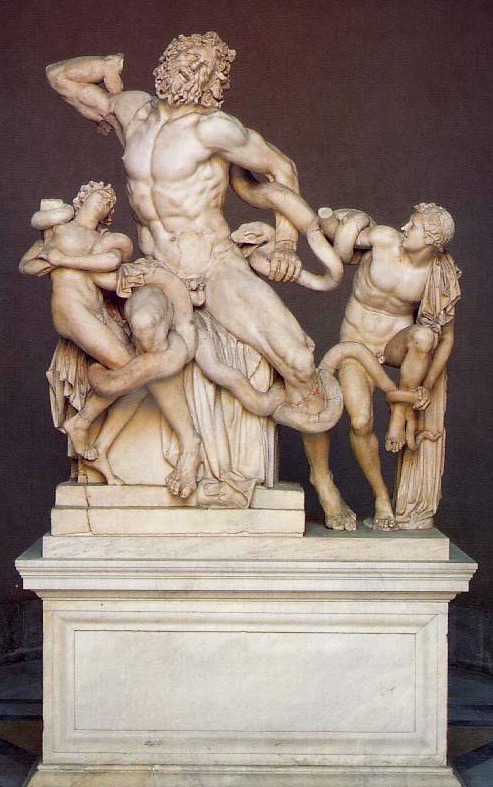
|
|
|
|
|
|

| Hagesandros, Athenodoros and Polydoros of Rhodes, Laocoon and His Sons (ca. 175-150 BC). Marble, 242 cm, Museo Pio Clementino, the Vatican (from Mark Harden's Artchive, http://www.artchive.com, 7.viii.00) |
| Instructor: Dr. Annette L. Giesecke |
| Office: 445 Smith Hall; hours: Thurs. 10:45-11:45; x0545 |
| Texts: M. Balme and G. Lawall, Athenaze Book I and Athenaze Book II, Oxford U P |
| COURSE DESCRIPTION: This course is the second and final part of Elementary Ancient Greek. The focus of the course is on providing students with a sufficient grasp of Greek grammar, vocabulary, and usage to enable them to read full, unaltered texts in ancient Greek. This course is followed by Greek 213, Intermediate Ancient Greek: Homer. This will be the students' first reading course, and the course text will be either Homer's Iliad or Odyssey. |
| COURSE REQUIREMENTS: As this course meets only two times a week,
it is essential that students keep abreast of assignments. In order to
prevent students from falling behind, a brief quiz will be administered
daily. The quizzes will focus on new vocabulary but will occasionally test
new grammar. Attendance is an absolute must for success in the course,
and students are encouraged to participate even though they may feel unsure
of their mastery of the topic at hand. There is never any shame in trying
-only in failing to try. There will be two tests, a midterm and a final
examination. Please note that the class participation component of the
final grade is substantial. This is where lack of attendance will be reflected.
A note on homework: all exercises are to be written out to be collected, and it is assumed that each day's homework includes a review of the day's grammar lesson. |
| Course components will be weighted as follows: |
|
|
|
|
| Honors Section : Those students taking this course for Honors credit will have the following additional course requirements: Honors Students will be expected, in a sense, to be course leaders. They should continue, as they have in the past, to initiate discussion and to volunteer to tackle readings.Honors Students will be assigned slightly more reading than the regular section (or more, if they wish). In the course of the semester, Honors Students will be asked to give a brief "cultural" presentation to the class. This is part of an effort to give the class a bit of a feel for ancient Greek life and art. |
| Schedule of Classes and Assignments: |
|
February 11: review of verbs and tenses to date/ primary and secondary HW: learn vocab. p. 132, review verb forms 13: irregular second aorists, first aorists
20: first aorist of liquid stem verbs
25: Imperfect tense
27:
March 4: quiz on participles; read p. 152, relative pronouns, read.
p. 161
6: comparative degree of adjectives and adverbs, read p. 169
11: "this" and "that", interrogatives
13:
18. read story, contract verbs in "o"
20: root aorists, contract verbs, review
25: Midterm Test- on chapters 14-end
27: Future Tense (Book II)
BREAK April 8: go over all homework (reading p. 7), practice of formation
of the future tense (ex. 17a and b)
10: "to go" , uses of the participle (p. 17), reading pp. 14-16
15: HW: ex. 18 d 3-10; study vocab. p. 28; study forms of "to give"and "to place"on pp. 22-24. 17: HW: finish reading p. 30; do ex. 18f and review grammar p. 31; study grammar p. 35-5 and prepare ex. 19a; if you can get to it, please start learning vocab. p. 40. 22: HW: prepare ex. 19c; learn vocab. p. 20 24: HW: study "set up" p. 49-50, prepare ex. 20 a and b; learn vocab. p. 53; time permitting, please finish the story on p. 47 line 13. 29: HW: learn vocab. p. 58 and read story p. 59 May 1: HW: study the subjunctive, prepare ex. 21a and b; study vocab. p. 66 6: HW: study vocab. p. 66 again; study grammar pp. 69-70; prepare ex. 21d and e. 8: HW: prepare ex. 22a and 22c except 5, 10, and 12. Remember that you don't need to worry about conditional sentences yet. 13: HW: conditionals p. 192-4 except ones with the optative. Read pp. 72-4 15: HW: read pp. 80-1 and study vocab. |
Foreign Languages and Literatures Home Page
Department of Foreign Languages
and Literatures
325 Smith Hall, University of
Delaware, Newark DE 19716
(302) 831-6882